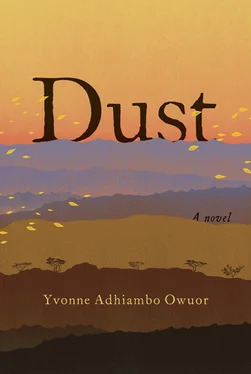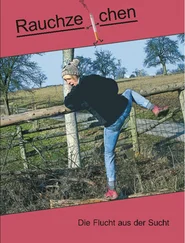Nyipir’s head had almost jumped out of his neck. In one move, he dropped the Bible, surged up, strode over, and snatched the book from Ajany’s hands, snapping it shut. In a shredding tone he said, “Brush your teeth. Go to sleep. It’s late. You, too, Odidi.”
Ajany had run out of the room, down the steps, and into the living room and thrown herself behind a settee. Odidi found her there. He crawled in next to her, let her weep into his shoulder. “I c-can’t never get the spellings right,” she mourned.
Odidi had said, “ ’Jany, ’Jany, don’t cry.”
She had wept until she fell asleep in her brother’s arms.
Now.
Ajany rustles book pages, sitting cross-legged between a gramophone and a Lamu chest, next to which lie three elephant tusks and moth-eaten sheepskin rugs. In the room, four leso s in a heap, a curved horn on which fat white cows with slanted eyes are painted in brown, gold, and white, Ethiopian Orthodox art, wood etchings, and landscape watercolors. A twenty-by-forty-centimeter painting titled The Last of the Quaggas . On the eastern wall, a still-flaking depiction of a green robed Saint George conversing with a resigned gold-sashed, golden-fire-sworded Archangel Uriel with only a quarter of his grandeur intact, victim of the brown dirt trails of termite nests.
A creak and grumble from one of two massive water tanks sitting on platforms and posts inside the roof. They had leaked for years, creating a grooved, reliable wide tear line that sustained the life of small things. Ajany disturbs a small cloud of insects as she wanders out. She falters outside Odidi’s room.
Odidi .
Crossing time, she trudges in, looks around, glimpsing shadows of brother that slice into her heart, her stomach. No tears. Ajany sits on Odidi’s low acacia-wood bed, rearranging its grimy, thin floral cover. Dust of spaces. In the wall recesses that served as his cupboard, emptiness. Ajany folds herself into his old bed and curls into a ball, hands clinging to feet, as she remembers the things that make a brother: Voice. Deep-seeing eyes. His music — old fashioned Afro-rumba. Franklin Boukaka, Fundi Konde, Mzee Ngala. Addiction to water songs — a liturgy of flowing, bubbliness. Even the camels listened to him. Rockdrill laughter, excavating terror; salt in soup; no sugar in tea made from rangeland herbs. Sign of the cross before converting a try — Shifta the Winger’s trademark. Soaring out of bed to meet the sun, shaking his sister awake and making her join him in watching sunspots grow and grow. Whistling. Odidi lying on warmed-up stones to witness the evening’s departure. Large arms — wings, really — that engulfed fear. Words suggesting Obarogo and then vanquishing the bogeyman in the same breath. Heartbeats. This is my brother . And then, in dreams, she has returned to Wuoth Ogik and Odidi is shouting from akwap a emoit —the land of antagonists — that she hurry to watch the advent of a moonlit indigo night.
The Kalacha dusk will soon descend in colors borrowed from another country’s autumn. Cattle will low their way home, bells clanging; white Galla goat kids in the boma will raise a chorus in answer to Galgalu’s whistling. Barking herd dogs; bleating fat-tailed, black-faced sheep. Nyipir will watch his animals return, greeting them by name, observing marks, bumps, limps, and moods. He will stroke the head and trained, curved horns of his elegant red dance-ox. When she wakes up, hours later, after remembering where she is, Ajany will join Galgalu in the milking shed.
What endures?
Heat of fresh milk.
A kid butts Ajany’s leg. She shoos it away.
What endures?
Galgalu.
What endures?
Fear of lunacy.
But not if she dies first.
Ajany glances at Odidi’s coffin.
Nightfall endures.
And when, later, flames sputter inside Galgalu’s cracked hurricane lamp, an orange glow appears, the same as that which had assured two desert children that light confounds darkness. That is how they wait for Akai-ma to return home.
THE NEW DAY’S MORNING LIGHT DRIPS AND ENGRAVES HUMPS into surfaces. Nyipir stares at his gnarled hands, hands that scrub his face four times a day, and have done so for forty years. Galgalu leaves to pasture the ranch animals. Enshrouding the land a mantle of silence that is vast, feral, and resplendent under naked blue skies in a season that is drier than a dead chameleon’s hide. The stillness is interspersed with the buzz-drone of blue flies.
Nyipir now wipes the coffin lid until it shines, and he greets his son: “You look well.” Slurred words. Nyipir imagines his son’s rock crypt. “I’ll build you a home big and strong … as you are.” New lines on his face: “You’re safe now.”
When he lifts the hoe to dig, old scars tingle in his hands, burning a silent man from the inside out. Nyipir hits the ground to the tune of one-word thoughts: Akai! Her name is a snuffle. And then it is noon, and her name— Akai —is a hard, salt tear ball stuck in the back of Nyipir’s throat.

Within that day, sporadic howls, and Galgalu crashes into the courtyard without the livestock. A jarring “Wo d’abeela, halale …”
An elderly keeper of ritual turned necromancer, a d’abeela , had turned his turban on him — a death curse. Galgalu flings the rusty G3 rifle to the ground, and turns to see if the rabid elder has followed him.
“What? Where?” Nyipir wields the hoe, fight-ready, thinking of his buried arsenal inside the cattle boma , of how to reach it, how to distribute arms.
Ajany runs into view. Galgalu stretches out his right thumb to squeeze his tears. He blows his nose with his other hand; the sounds are interrupted by his muddled words: “Aya! D’abeela … wo d’abeela.…”
“Who?” Nyipir shouts.
This is what had happened:
All had been well at the western pastures when Galgalu had blown air into his cupped hands — a whistling —fuulido —to summon a bird, a white, long-tailed honeyguide. It appeared. He followed it. As he scrambled through the scrub, he heard bees buzzing. He was reaching for the honeycomb when he heard a piercing cry, thought it was an eagle, and swung around to look. There, standing behind him, was a d’abeela .
The disenchanted priest had been prowling the land looking for people upon whom he would incant malice and whom he could afflict with the miserable bile that broiled in his soul. God had abandoned him. He would show God that he was not too old to taint favored souls. Too old! All his five sons had participated in the decision to replace him, as if he were already dead. So he had escaped the boundaries of his vast home, wandered farther, and turned his stiff white turban so its seams were at the front rather than on the left, where they should always be. The gesture was the ritual, the performed curse. So fearful that not even the dying named it, so rare, it had not been seen in five generations. So potent, nothing existed that could halt its malevolent intention. The d’abeela had happened upon a honey-seeking fool.
Incessant flies buzz. Kites soar. Ajany’s eyes fixate on Galgalu’s fallen rifle. “Where are the animals?” she murmurs.
“The animals?” Nyipir repeats to Galgalu.
Galgalu uses his chin to point westward.
Nyipir shouts to Ajany, “Bring your gun.”
“Where is it?” Her heart is screaming.
“Galgalu’s room.”
She pivots, runs toward the adobe hut.
Inside the three-roomed shelter with assorted pictures papering the wall, a sepia photo of Akai-ma, and a Sellotaped copy of the Oganda family photograph, an Ethiopian calendar featuring Orthodox saints, three folding chairs, a slightly raised bed. This had been one of Ajany’s childhood sanctuaries. Here she could hide from everything and Galgalu would pretend not to know where she was.
Читать дальше












